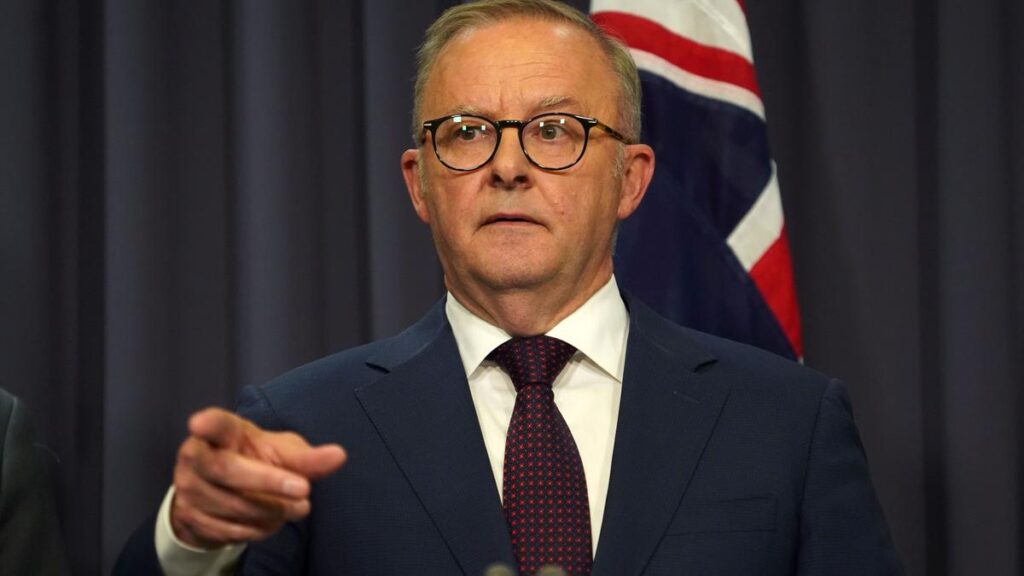
Prime Minister Anthony Albanese speaks to the media during a press conference at Parliament House in Canberra, Monday, December 9, 2024. Albanese was responding to the firebombing of the Adass Israel Synagogue in Melbourne. (AAP Image/Dominic Giannini) NO ARCHIVING
Prime Minister Anthony Albanese is facing calls to bolster security for Australia’s Jewish communities following a disturbing arson attack on a synagogue in east Melbourne. The incident occurred on Friday night when a flammable liquid was set ablaze at the synagogue’s entrance, while approximately 20 congregants were inside. Fortunately, all occupants were able to escape unharmed via the rear exit.
Shadow Attorney-General Julian Leeser has publicly urged the Prime Minister to follow the example of international leaders by intensifying efforts to safeguard Jewish communities amid rising anti-Semitic incidents linked to tensions in the Middle East. Leeser criticized Albanese for not responding to a letter sent by Opposition Leader Sussan Ley, Shadow Minister for Home Affairs Andrew Hastie, and himself on June 15, which emphasized the urgent need for increased protection measures.
Calls for Action and Increased Security
Leeser expressed his dismay, stating,
“This is a very sad day for Australia… one of the oldest synagogues in Australia has been fire-bombed. It’s a synagogue that bespeaks the rich and long history of the Jewish people in this country.”
He further highlighted that the attack is not just on the Jewish community but on all Australians, underscoring the persistent issue of anti-Semitism.
The Opposition is pressing the Prime Minister to clarify what actions have been taken to protect Jewish communities and to justify any lack of increased security measures. Leeser has suggested that a heightened police presence and enhanced security around Jewish community buildings are necessary to combat the ongoing threat.
Official Condemnations and Community Reactions
Victorian Premier Jacinta Allan condemned the attack, describing it as “disgraceful behavior by a pack of cowards.” She emphasized the gravity of the incident occurring on Shabbat, a day of rest and worship in Judaism, labeling it an act of anti-Semitism.
“Any attack on a place of worship is an act of hate, and any attack on a Jewish place of worship is an act of anti-Semitism,”
Allan stated.
In response to the attack, Victorian police have released an image of a suspect described as a Caucasian male in his 30s, with a beard and long hair. The damage from the fire was fortunately contained to the synagogue’s front entrance, preventing further harm.
Context and Historical Parallels
This incident is part of a broader pattern of increasing anti-Semitic attacks globally, often exacerbated by geopolitical tensions. Historical parallels can be drawn to previous periods of unrest in the Middle East, which have similarly seen spikes in anti-Semitic incidents worldwide. Experts argue that such attacks not only threaten the immediate safety of Jewish communities but also undermine social cohesion and multicultural harmony.
According to a report by the Executive Council of Australian Jewry, there has been a noticeable rise in anti-Semitic incidents in Australia over recent years. This trend mirrors global patterns, where Jewish communities have faced heightened threats and violence.
Implications and the Path Forward
The call for increased protection comes at a critical time, as communities seek reassurance and tangible action from their leaders. The Opposition’s demands for clarity and decisive measures highlight the urgency of addressing security concerns proactively.
Moving forward, it will be essential for the Australian government to engage with Jewish community leaders, law enforcement, and security experts to develop comprehensive strategies that ensure the safety and well-being of all citizens. The incident serves as a stark reminder of the need for vigilance and unity in the face of hate.
As the investigation continues, the broader community will be watching closely to see how authorities respond and what steps will be taken to prevent future attacks. The outcome could set a precedent for how Australia addresses not only anti-Semitic threats but also broader issues of religious and cultural intolerance.






